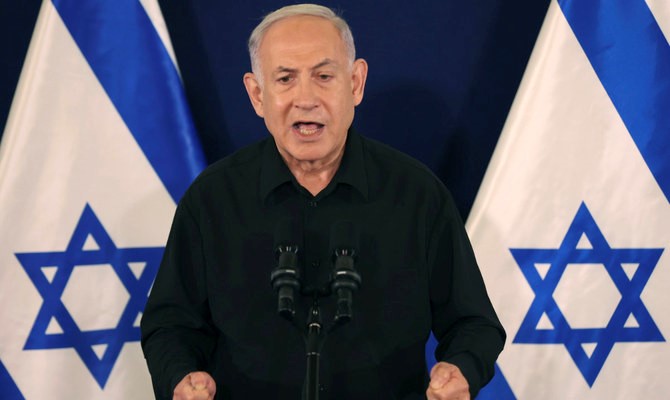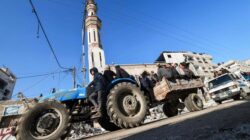In a televised address, Israeli Prime Minister Benjamin Netanyahu announced on Saturday night that the Israeli military has initiated a “second stage” in the conflict with Hamas. This phase involves sending ground forces into Gaza and expanding attacks from the ground, air, and sea. Netanyahu framed the conflict as a critical battle for Israel’s survival and cautioned that the assault would escalate further in preparation for a significant ground invasion into Gaza.
He stated, “There are moments when a nation faces two options: to act or to face annihilation. We are currently undergoing that test, and I have no doubt about the outcome: We will succeed. We will act, and we will emerge victorious.”
The intensified bombardment, described by Gaza residents as the most severe of the conflict, disrupted communication in the region and isolated the 2.3 million people living in the besieged enclave from the outside world. The Israeli military released grainy images showing tank columns moving in open areas of Gaza, many near the border, and reported airstrikes on numerous Hamas tunnels and underground bunkers. Eliminating these underground facilities is a central goal of Israel’s campaign to weaken the ruling group in the territory following its violent incursion into Israel three weeks ago.
The escalation placed increased pressure on the Israeli government to secure the release of dozens of hostages taken during the October 7 attack by Hamas, where militants infiltrated Israeli towns near Gaza and targeted civilians and soldiers. This unprecedented attack during a major Jewish holiday triggered the ongoing conflict between Israel and Hamas, which has the potential to escalate into a broader conflict in the Middle East.
Families of the hostages met with Netanyahu and expressed support for a potential exchange of Palestinian prisoners held in Israel, an idea suggested by the top Hamas leader in Gaza. Netanyahu emphasized that Israel is determined to bring back all the hostages and argued that the expanding ground operation would aid in this mission. He couldn’t disclose all details due to the sensitive and secretive nature of the efforts.
Netanyahu did not address calls for a ceasefire but emphasized Israel’s future hinged on its success against “enemy” forces, drawing on references to Jewish history and past military conflicts.
Netanyahu also acknowledged that the October 7 incident, where more than 1,400 people were killed, required a comprehensive investigation, and he stated that everyone, including himself, would have to answer questions.
The Israeli military indicated that it was progressively expanding its ground operations in Gaza, although it stopped short of terming it an all-out invasion. The chief military spokesman hinted at a strategy of staged escalation instead of a massive and overwhelming offensive.
Despite the Israeli offensive, Palestinian militants continued to launch rockets into Israel, with constant sirens in southern Israel reminding of the threat.
The death toll for Palestinians in Gaza reached just over 7,700 people since the conflict’s start, with 377 deaths reported since late Friday, according to the Gaza Health Ministry. Most of the casualties have been women and minors. Communication disruption severely hampered the health network, making it nearly impossible for residents to call ambulances, and emergency teams struggled to locate those in need amid artillery barrages and airstrikes.
An estimated 1,700 people remained trapped beneath the rubble, and Gaza hospitals faced dire challenges in coping with the overwhelming number of casualties. Some residents resorted to using their hands to rescue injured individuals from the debris and transport them in personal vehicles or donkey carts.
The situation has led to the tragic loss of dignity and closure for mourners, as overcrowded cemeteries have forced families to exhume long-buried bodies and dig deeper graves.
More than 1.4 million people in Gaza have fled their homes, with nearly half seeking shelter in UN schools and facilities following warnings from the Israeli military about the dangers of staying in northern Gaza. Some have not evacuated to the south due to Israeli bombings in supposed safe areas where conditions have deteriorated, leading to shortages of food and water. Additionally, Israel disrupted electricity supplies early in the conflict.
Humanitarian workers stressed that the aid allowed into Gaza from Egypt over the past week is insufficient compared to the actual need. Gaza hospitals have struggled to obtain fuel for emergency generators that power critical equipment like incubators.
The UN agency for Palestinian refugees, responsible for sheltering and schooling almost half of the displaced Gaza residents, lost contact with most of its staff, complicating aid coordination efforts.
The intensification of the air and ground campaign raised new concerns about hostages in Gaza. In Tel Aviv, hundreds of relatives demanded that the return of their loved ones take precedence over military objectives.
In response to these tensions, Yehiyeh Sinwar, Hamas’ top leader in Gaza, indicated that Palestinian militant groups were ready to release all hostages immediately if Israel released all Palestinians held in Israeli prisons. The Israeli military spokesperson dismissed this offer as “psychological terror.”
In Cairo, Egyptian President Abdel Fattah El-Sisi mentioned his government’s efforts to de-escalate the conflict through negotiations with the involved parties to secure the release of prisoners and hostages. He also communicated with UN Secretary-General Antonio Guterres, who expressed surprise at the significant escalation of violence in Gaza.
Impatience was growing in many quarters, with Turkish President Recep Tayyip Erdogan announcing in Istanbul that Turkey was preparing to label Israel as a “war criminal” for its actions in Gaza.
The ongoing conflict has the potential to spark a wider regional war, causing concern among Arab nations, including those allied with the United States and those with peace agreements or normalized relations with Israel.
Source: AP




